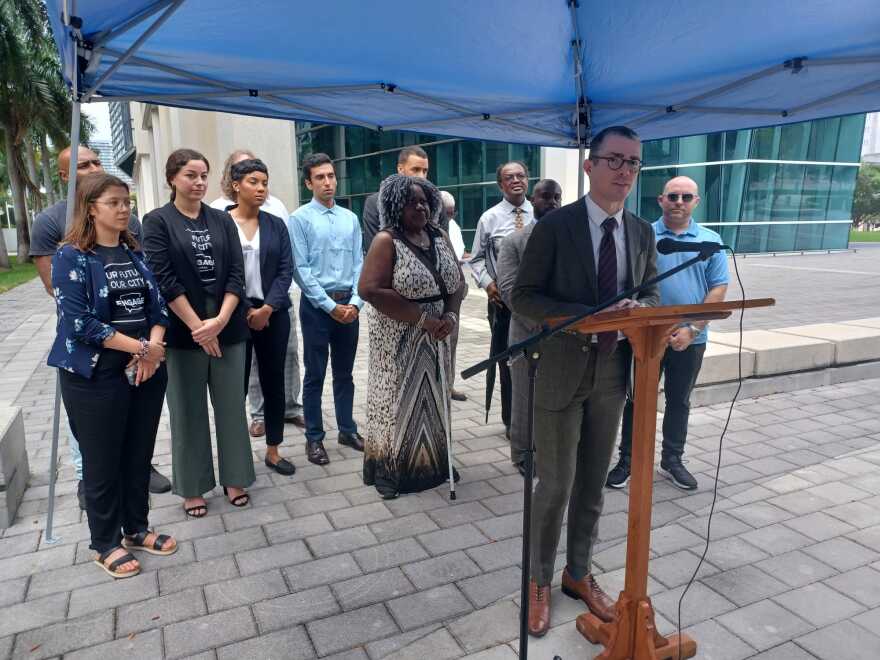More than a year after local civil rights groups and the ACLU of Florida sued the City of Miami for allegedly racially gerrymandering its map of city voting districts, a federal judge has sided with the plaintiffs.
On Wednesday afternoon, U.S. District Judge K. Michael Moore ruled that Miami commissioners violated the constitutional rights of Miami residents when they redrew the city’s map in 2022 to maintain three Hispanic districts, one Black district and one “Anglo” district.
“By sorting its citizens based on race, the City reduced Miamians to no more than their racial backgrounds, thereby denying them the equal protection of the laws that the Fourteenth Amendment promises,” Moore wrote in his filing.
“Today is another win for democracy and equal representation,” said Nicholas Warren, staff attorney with the ACLU of Florida, in a statement. “Our Constitution protects against racial gerrymandering, which the city of Miami egregiously violated."
"We look forward to another remedial process that finally ensures voters can choose their representatives, rather than politicians choosing their voters," Warren said.
READ MORE: Racial gerrymandering trial begins in Miami
In his post-trial order, the judge not only ruled the city violated the U.S. Constitution but said it had made "multiple misrepresentations" to the court. Although the ruling doesn't conclude the dispute central to the lawsuit, it gives plaintiffs the upper hand in the ongoing negotiations over a final map.
"These are the serious harms that the City perpetuated, and Miamians suffered. Today, the Court permanently prevents the City from racial gerrymandering any longer," Moore wrote.
Plaintiffs in the gerrymandering case applauded Moore's ruling.
“Today is yet another victory for accountability," said Engage Miami’s executive director Rebecca Pelham in a statement. "We look forward to engaging with the city in a remedial process, which considers the input of all residents.”
Daniella Pierre, president of the NAACP Miami-Dade Branch, said in a statement that "democracy depends on the judicial system keeping lawmakers in check."
"Today is a lesson to everyone in power: efforts to diminish Black and Latino voices will not go unchallenged," Pierre said.
Engage Miami and both Miami-Dade County chapters of the NAACP were among several civic advocacy groups, including Grove Rights and Community Equity, Inc., that sued the city in December of 2022.
They had hoped to enact a new city district map before the 2023 local elections. In May 2023, Moore ruled that they were likely to prove gerrymandering and ordered the city to create a new map.
“We’re proud we continued to fight for equitable treatment of Miami’s residents,”
Despite the judge's ruling that even the city's new map did not meet constitutional standards, the U.S. Supreme Court quashed an effort to use the plaintiffs' proposed map because the proposed change was too close to Election Day.
Injurious racial gerrymandering
According to Moore, racial gerrymandering causes 'injury' when individuals are classified on the basis of race for the purpose of drawing voting districts.
The city’s stated goal of maintaining minority representation on the city commission did not sway Moore’s findings.
“Therefore, whether the City believed the pursuit of diversity in representation could justify racial gerrymandering is immaterial. The harm stems not from the City’s objective, but rather, from the City’s racial classification of every Miamian in pursuit of that goal,” he wrote.
Since 1997, when the City of Miami first enacted voting districts over having at-large commission seats, race was a predominant factor in district composition, which Moore points to in his order. The stated purpose of creating districts was so that there would always be a Black member on the City Commission.
Moore also noted that the city seems to have contradicted the facts in its legal arguments. “In support of its … argument, Defendant’s brief to the Eleventh Circuit contained multiple misrepresentations that contradicted the record in this case,” he wrote.
Moore stated that neither the city’s original 2022 redistricted map, nor its updated map that commissioners approved in 2023 after the lawsuit was filed, stand up to scrutiny. Both are unconstitutionally racially gerrymandered.

Negotiations followed a bench trial
This past January, the parties engaged in a bench trial with Judge Moore to lay out their arguments.
Since that process, the City of Miami and the plaintiffs have been engaged in settlement negotiations to agree on a solution. The city is scheduled to have a private attorney-client session on Thursday, April 11 to discuss the litigation. With Moore’s order siding with the advocacy groups, the plaintiffs will have more leverage to seek a favorable settlement.
In his filing, Moore stated that the City of Miami and its officials are barred from holding any elections under the current district map. The court will hold a status conference where it can order the city to create a new map and hold special elections — which could completely change the make-up of Miami's city commission.
A city spokesperson said they could not respond to WLRN's request for comment in time for this story.






